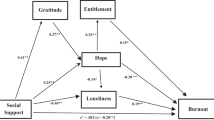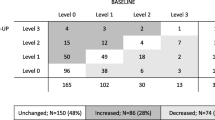Abstract
Purpose
To investigate the relationship between social support at work and burnout among teachers, independent of the teachers’ private social and environmental context.
Methods
In the 2013 “Teachers’ Quality of Life” population-based study (France, n = 2653), burnout symptomatology was assessed using the Maslach Burnout Inventory. The score for each dimension (emotional exhaustion, depersonalization and personal accomplishment) was dichotomized using extreme tertiles. Global score for social support at work, and subscores by source and type were derived from the Karasek Job Content Questionnaire and were categorized into tertiles (low, medium, and high). The private context was appraised through the “social relationships” and “environment” subscales of the short version of the World Health Organization Quality of Life Questionnaire. Associations between social support at work and burnout indicators were evaluated among 2473 teachers with complete data, using logistic regression models adjusted for the private context plus sociodemographic and work-related characteristics.
Results
Eight percent of the teachers showed simultaneously high emotional exhaustion, high depersonalization and low personal accomplishment symptoms and were considered as burnout cases. After controlling for the private context, teachers who reported high social support at work were significantly less likely to report burnout [odds ratio (95% confidence interval) high vs. low = 0.62 (0.40, 0.98)]. When distinguishing the source of social support at work, only high social support from supervisors remained significantly associated with a lower risk of burnout [0.43 (0.27, 0.71)].
Conclusions
Improving social support at work, especially from a hierarchical point of view, may be an effective target to promote teacher’s well-being.
Similar content being viewed by others
References
Arvidsson I, Håkansson C, Karlson B et al (2016) Burnout among Swedish school teachers—a cross-sectional analysis. BMC Public Health 16:823. https://doi.org/10.1186/s12889-016-3498-7
Baumann C, Erpelding ML, Régat S et al (2010) The WHOQOL-BREF questionnaire: French adult population norms for the physical health, psychological health and social relationship dimensions. Rev Epidemiol Sante Publique 58:33–39. https://doi.org/10.1016/j.respe.2009.10.009
Beauregard N, Marchand A, Blanc M-E (2011) What do we know about the non-work determinants of workers’ mental health? A systematic review of longitudinal studies. BMC Public Health 11:439. https://doi.org/10.1186/1471-2458-11-439
Berkman LF, Glass T, Brissette I, Seeman TE (2000) From social integration to health: Durkheim in the new millennium. Soc Sci Med 51:843–857. https://doi.org/10.1016/S0277-9536(00)00065-4
Bianchi R (2016) Occupational and non-occupational strains should be concomitantly considered in research on burnout, organizational commitment, and turnover intention. Int J Nurs Stud 53:403–404. https://doi.org/10.1016/j.ijnurstu.2015.10.005
Bianchi R, Truchot D, Laurent E et al (2014) Is burnout solely job-related? A critical comment. Scand J Psychol 55:357–361. https://doi.org/10.1111/sjop.12119
Brenninkmeijer V, VanYperen N (2003) How to conduct research on burnout: advantages and disadvantages of a unidimensional approach in burnout research. Occup Environ Med 60(Suppl 1):i16–i20. https://doi.org/10.1136/oem.60.suppl_1.i16
Burke R, Greenglass E (1993) Work stress, role conflict, social support, and psychological burnout among teachers. Psychol Rep 73:371–380
Cohen S (2004) Social relationships and health. Am Psychol 59:676–684. https://doi.org/10.1037/0003-066X.59.8.676
Constable JF, Russell DW (1986) The effect of social support and the work environment upon burnout among nurses. J Hum Stress 12:20–26. https://doi.org/10.1080/0097840X.1986.9936762
Demerouti E, Bakker AB, Vardakou I, Kantas A (2003) The convergent validity of two burnout instruments: a multitrait–multimethod analysis. Eur J Psychol Assess 19:12–23
Dion G, Tessier R (1994) Validation de la traduction de l’Inventaire d’épuisement professionnel de Maslach et Jackson. [Validation of a French translation of the Maslach Burnout Inventory (MBI).]. Can J Behav Sci (Can des Sci du Comport) 26:210–227. https://doi.org/10.1037/0008-400x.26.2.210
Fiorilli C, Gabola P, Pepe A et al (2015) The effect of teachers’ emotional intensity and social support on burnout syndrome. A comparison between Italy and Switzerland. Rev Eur Psychol Appl 65:275–283. https://doi.org/10.1080/10615800701742461
Gariepy G, Honkaniemi H, Quesnel-Vallee A (2016) Social support and protection from depression: systematic review of current findings in Western countries. Br J Psychiatry 209:284–293. https://doi.org/10.1192/bjp.bp.115.169094
Greenglass ER, Fiksenbaum L, Burke RJ (1994) The relationship between social support and burnout over time in teachers. J Soc Behav Personal 9:219–230
Guite HF, Clark C, Ackrill G (2006) The impact of the physical and urban environment on mental well-being. Public Health 120:1117–1126. https://doi.org/10.1016/j.puhe.2006.10.005
Hakanen JJ, Bakker AB (2017) Born and bred to burn out: a life-course view and reflections on job burnout. J Occup Health Psychol 22:354–364. https://doi.org/10.1037/ocp0000053
Hakanen JJ, Bakker AB, Schaufeli WB (2006) Burnout and work engagement among teachers. J Sch Psychol 43:495–513. https://doi.org/10.1016/j.jsp.2005.11.001
Hakanen JJ, Schaufeli WB, Ahola K (2008) The job demands-resources model: a 3-year cross-lagged study of burnout, depression, commitment, and work engagement. Work Stress 22:224–241. https://doi.org/10.1080/02678370802379432
Harvey SB, Modini M, Joyce S et al (2017) Can work make you mentally ill? A systematic meta-review of work-related risk factors for common mental health problems. Occup Environ Med 74:301–310. https://doi.org/10.1136/oemed-2016-104015
Holt-Lunstad J, Smith TB, Layton JB (2010) Social relationships and mortality risk: a meta-analytic review. PLoS Med. https://doi.org/10.1371/journal.pmed.1000316
Iwanicki EF, Schwab RL (1981) A cross validation study of the Maslach Burnout Inventory. Educ Psychol Meas 41:1167–1174. https://doi.org/10.1177/001316448104100425
Karasek R, Theorell T (1990) Healthy work: stress, productivity, and the reconstruction of working life. Basic Book, New York
Kinman G, Wray S, Strange C (2011) Emotional labour, burnout and job satisfaction in UK teachers: the role of workplace social support. Educ Psychol 31:843–856. https://doi.org/10.1080/01443410.2011.608650
Kokkinos CM (2007) Job stressors, personality and burnout in primary school teachers. Br J Educ Psychol 77:229–243. https://doi.org/10.1348/000709905X90344
Madsen IE, Jorgensen AF, Borritz M et al (2014) Is the association between high strain work and depressive symptoms modified by private life social support: a cohort study of 1074 Danish employees? BMC Public Health 14:698. https://doi.org/10.1186/1471-2458-14-698
Maslach C, Jackson SE (1981) The measurement of experienced burnout. J Organ Behav 2:99–113. https://doi.org/10.1002/job.4030020205
Maslach C, Leiter MP (2016) Understanding the burnout experience: recent research and its implications for psychiatry. World Psychiatry 15:103–111. https://doi.org/10.1002/wps.20311
Naghieh A, Montgomery P, Bonell CP et al (2015) Organisational interventions for improving wellbeing and reducing work-related stress in teachers. In: Naghieh A (ed) Cochrane database of systematic reviews. Wiley, Chichester, pp 10–13
Niedhammer I (2002) Psychometric properties of the French version of the Karasek Job Content Questionnaire: a study of the scales of decision latitude, psychological demands, social support, and physical demands in the GAZEL cohort. Int Arch Occup Environ Health 75:129–144. https://doi.org/10.1007/s004200100270
Niedhammer I, David S, Degioanni S (2006) La version française du questionnaire de Leymann sur la violence psychologique au travail: le “Leymann Inventory of Psychological Terror” (LIPT). Rev Epidemiol Sante Publique 54:245–262. https://doi.org/10.1016/S0398-7620(06)76720-7
Oberle E, Schonert-Reichl KA (2016) Stress contagion in the classroom? The link between classroom teacher burnout and morning cortisol in elementary school students. Soc Sci Med 159:30–37. https://doi.org/10.1016/j.socscimed.2016.04.031
Pedrabissi L, Rolland JP, Santinello M (1993) Stress and burnout among teachers in Italy and France. J Psychol Interdiscip Appl 127:529–535
Pikhart H, Pikhartova J (2015) The relationship between psychosocial risk factors and health outcomes of chronic diseases. a review of the evidence for cancer and cardiovascular diseases. WHO Regional Office for Europe, Copenhagen (Health Evidence Network (HEN) synthesis report)
Russell DW, Altmaier E, Van Velzen D (1987) Job-related stress, social support, and burnout among classroom teachers. J Appl Psychol 72:269–274. https://doi.org/10.1037//0021-9010.72.2.269
Santin G, Geoffroy B, Bénézet L et al (2014) In an occupational health surveillance study, auxiliary data from administrative health and occupational databases effectively corrected for nonresponse. J Clin Epidemiol 67:722–730. https://doi.org/10.1016/j.jclinepi.2013.10.017
Schonfeld IS, Bianchi R, Luehring-Jones P (2017) Consequences of job stress for the mental health of teachers. In: McIntyre TM, McIntyre SE, Francis DJ (eds) Aligning perspectives on health, safety and well-being. Educator stress: an occupational health perspective. Springer International Publishing, Cham, Switzerland. pp 55–75. https://doi.org/10.1007/978-3-319-53053-6_3
Sears LE, Shi Y, Coberley CR, Pope JE (2013) Overall well-being as a predictor of health care, productivity, and retention outcomes in a large employer. Popul Health Manag 16:397–405. https://doi.org/10.1089/pop.2012.0114
Tang S, Siu O, Cheung F (2014) A study of work-family enrichment among Chinese employees: the mediating role between work support and job satisfaction. Appl Psychol 63:130–150. https://doi.org/10.1111/j.1464-0597.2012.00519.x
Uchino BN (2006) Social support and health: a review of physiological processes potentially underlying links to disease outcomes. J Behav Med 29:377–387. https://doi.org/10.1007/s10865-006-9056-5
Uchino BN, Bowen K, Carlisle M, Birmingham W (2012) Psychological pathways linking social support to health outcomes: a visit with the “ghosts” of research past, present, and future. Soc Sci Med 74:949–957. https://doi.org/10.1016/j.socscimed.2011.11.023
Van Dyck D, Teychenne M, McNaughton SA et al (2015) Relationship of the perceived social and physical environment with mental health-related quality of life in middle-aged and older adults: mediating effects of physical activity. PLoS One 10:1–16. https://doi.org/10.1371/journal.pone.0120475
Vercambre M-N, Brosselin P, Gilbert F et al (2009) Individual and contextual covariates of burnout: a cross-sectional nationwide study of French teachers. BMC Public Health 9:333. https://doi.org/10.1186/1471-2458-9-333
Wieclaw J, Agerbo E, Mortensen PB, Bonde JP (2005) Occupational risk of affective and stress-related disorders in the Danish workforce. Scand J Work Environ Health 31:343–351. https://doi.org/10.5271/sjweh.917
Yuh J, Choi S (2017) Sources of social support, job satisfaction, and quality of life among childcare teachers. Soc Sci J. https://doi.org/10.1016/j.soscij.2017.08.002
Zavidovique L, Gilbert F, Vercambre-Jacquot M-N (2017) Bien-être au travail et qualité de vie des enseignants: quelles différences selon l’ancienneté? Arch des Mal Prof l’Environnement. https://doi.org/10.1016/j.admp.2017.09.005
Acknowledgements
The authors would like to thank Fabien Gilbert and Pascale Lapie-Legouis, as well as the Office of Statistical Studies on Personnel of the French Ministry of Education (Direction de l’évaluation, de la prospective et de la performance—DEPP).
Author information
Authors and Affiliations
Corresponding author
Ethics declarations
Conflict of interest
The authors declare that they have no competing interests.
Additional information
Publisher's Note
Springer Nature remains neutral with regard to jurisdictional claims in published maps and institutional affiliations.
Electronic supplementary material
Below is the link to the electronic supplementary material.
Rights and permissions
About this article
Cite this article
Temam, S., Billaudeau, N. & Vercambre, MN. Burnout symptomatology and social support at work independent of the private sphere: a population-based study of French teachers. Int Arch Occup Environ Health 92, 891–900 (2019). https://doi.org/10.1007/s00420-019-01431-6
Received:
Accepted:
Published:
Issue Date:
DOI: https://doi.org/10.1007/s00420-019-01431-6




